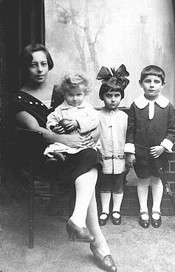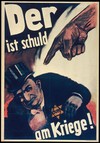Holocaust
"For whoever listens to a witness becomes a witness"
Excerpt from a speech given by Elie Wiesel at Yad Vashem*
http://www.yadvashem.org/yv/en/remembrance/multimedia.asp

Main Nazi Camps and Killing Sites This site features an interactive map of central Nazi camps and murder sites during the Holocaust. To view a certain encyclopedia entry, simply click on the name of the site on the map, or the relevant link in the list below. A collection of related items including video testimonies, research papers and photographs is also featured.
.gif)
http://www.yadvashem.org/yv/en/education/learning_environments/sites_map.asp
Definitions
Antisemitism: Hostility toward Jews as an ethnic or religious group, often accompanied
by social, economic and political discrimination.
Discrimination: Action based on prejudice or biased beliefs that results in unfair treatment
of individuals or groups; unjust conditions in areas such as employment, housing
and education.
Propaganda: The deliberate spreading of ideas or information, true or untrue, with the
purpose of manipulating public opinion to gain support for one’s cause or to discourage
support for another.
Racism: A set of beliefs based on perceived “racial” superiority and inferiority; a system
of domination that is played out in everyday interactions, and the unequal distribution
of privilege, resources and power.
Stereotype: A simplistic, firmly held belief, often negative, about individual characteristics
generalized to all people within that group.
Holocaust Denial: Holocaust denial is the claim that the genocide of the Jews during
World War II did not happen or did not happen to the extent historically recorded.
— Adapted from the Simon Wiesenthal Center’s Museum of Tolerance in Los Angeles
Righteous Gentiles | Shtetl | FRONTLINE | PBS
'Righteous Gentiles' is the phrase used for those non-Jews who risked their lives to save Jews during the Holocaust.
 Children eating on the street
Children eating on the street
in a ghetto.
 Babysitter with three
Babysitter with three
Jewish children.
Two of these children
did not live through
the war.

www.jewishvirtuallibrary.org/jsource/holo.html
Fate has placed upon the survivors of the Holocaust an unprecedented painful burden --that of revealing to the world the excruciating and most humiliating experiences of their lives. World War II began with Adolph Hitler's campaign against the Jews. The escalation of his crusade led to the extermination of many Jews and other undesirables. I Survived the Holocaust includes historical facts and stories about the Holocaust. Many authentic photographs from this period are presented here for you to view. This Web page is a tribute to the survivors of the Holocaust. http://isurvived.org
Entering the Camp by Fritz Lederer
In the Eruv of Tereseinstadt
A Series of 24 Engravings Created in 1946.
Edition of 50 from the collection of Gisela Konopka, Minneapolis
Holocaust and Genocide Studies: Virtual Museum
The Center for Holocaust and Genocide Studies' Virtual Museum provides you with primary sources such as slides, film, video, and audio clips that are accessible through an interactive table of contents. You will find a large collection of online museum exhibitions, a collection of art work that represents the artists' response to the Holocaust and genocide, and a collection of photographs of Holocaust memorials. A list of related exhibits is also provided along with a collection of histories and narratives and many teaching resources. http://www.chgs.umn.edu
Some Were Neighbors -- Collaboration and Complicity in the Holocaust
The online exhibit at the web site of the United States Holocaust Memorial Museum introduces the many different kinds of people who helped the Nazis during the Holocaust or did nothing to stand up for their fellow man. Through historic photographs, you can meet the neighbors, workers, teenagers, policemen, religious leaders, teachers and friends who witnessed the crimes of the Holocaust and choose to ignore them or to participate in them. Use the glossary, timeline and image gallery for better understanding. You are also invited to share your reflections.
Primary Source Material http://somewereneighbors.ushmm.org
Children During the Holocaust The Holocaust had a large impact on Jewish children living in Germany. One of the early laws established by the Nazis limited the number of Jewish children allowed in schools. By the end of the 1930’s Jewish children were not allowed to attend German schools. At that point, if they were not able to escape Germany, one of four things happened to Jewish children: They died in either concentration camps or after birth, they were hidden, or they were used as laborer or for medical experiments. http://www.projetaladin.org
Coming of Age In the Holocaust Designed for Bar and Bat Mitzvah-age students, this excellent web site from the Museum of Jewish Heritage features twelve first-person accounts of Holocaust survivors told through video, narratives and primary documents. Students can gain a personal connection to history and examine issues of ethics and personal responsibility. Begin with the student instructions and then explore the survivor stories to understand the challenges each survivor faced. In addition to the narratives, there are video testimonies, timelines of world events, maps, additional resources and project suggestions. http://comingofagenow.org
Life in Shadows: Hidden Children and the Holocaust One of the most terrifying and horrible events in the history of the world was during World War Two. The world was in political upheaval, and in the middle of Europe, Adolf Hitler was creating his Holocaust. Jewish people, men, women and children, were being slaughtered by the thousands. On this web site you can read personal stories of some of the children that were victims of the Holocaust, and how they managed to survive. http://www.ushmm.org
Voice/Vision Holocaust Survivor Oral History Archive This Web site provides a library of oral histories from survivors of the Nazi Holocaust of the Jewish people. Visitors can choose from over fifty interviews of survivors. The text transcript of the interview is available online along with the audio portion of the interview. The interviews cover a wide range of topics as they apply to each individual. Topics include family life before the war, religious life, the separation of family members, life in the concentration camps and ghettos, liberation, post-war life and more. http://holocaust.umd.umich.edu
Hidden Children and the Holocaust More than a million Jewish children were living in the region that was occupied by Nazi Germany during World War II. So great was the barbarism of the Holocaust that not even children were spared. In the camps and ghettos, children were among those deemed unfit to work and were exterminated. Learn about the thousands of Jewish children who went into hiding and the rescuers who helped them. Discover how the resistance offered false papers enabling some to live openly while others hid in attics and barns. Investigate the danger of being discovered by saying or doing the wrong thing.
http://www.jewishvirtuallibrary.org
Children During the Holocaust Many children were subjected to inhuman treatment during the Holocaust. Before Jewish and Gypsy children were banned from attending German schools, teachers would bring them up to the front of the classroom to insult them in front of the acceptable students. They were forced to live in ghettos before they were deported to concentration camps where many were killed, subjected to slave labor or experimented on. The Nazi party abused German children, too, by forcing them to join the Hitler Youth, which mentally brainwashed them to believe and follow orders without question to fight or condone the atrocities taking place. http://fcit.coedu.usf.edu
Norwood Resident Mr. Aron Greenfield Remembers
Martha and Aron Greenfield, owners of Brenner's Children's Shop, Norwood, MA
Genocide is a term created during the Holocaust and declared an international crime in the 1948
United Nations Convention on the Prevention and Punishment of the Crime of Genocide. The Con-
vention defines genocide as any of the following acts committed with the intent to destroy, in whole
or in part, a national, ethnic, racial or religious group... https://www.ushmm.org/
United States Holocaust Memorial Museum
The Warsaw Ghetto Uprising (April 19 - May 16, 1943) As British and American leaders met at a resort and decided they couldn't really help the European Jews, the Jewish inhabitants of the Warsaw ghetto took matters into their own hands. Although the resistance might seem hopeless, it was the only chance they had. When the Nazis occupied Warsaw, they walled off all the Jewish people in a prison-like ghetto. To be found outside the ghetto meant death. Within the ghetto; inhabitants suffered from hunger, disease, and overcrowding. When the Nazis deported most of the ghetto, those who remained decided to resist deportation with a few stockpiled weapons.
http://www.pbs.org
Camp Rebellions Rebellions were organised by Jewish prisoners at three of the six extermination camps - Treblinka, Sobibor and Auschwitz-Birkenau.
http://www.theholocaustexplained.org
On 14 October 44, a group of 300 prisoners escaped from Sobibor death camp. The people in this group photograph, taken on 1 August 1944, are just a few of the 50 that managed to evade re-capture.
© 2011 United States Holocaust Memorial Museum.
Text of Pope John Paul II's Speech at Yad Vashem 23/3/2000
"The words of the ancient Psalm, rise from our hearts:
``I have become like a broken vessel. I hear the whispering of many - terror on every side - as they scheme together
against me, as they plot to take my life. But I trust in you, O Lord: I say, 'you are my God.''' (Psalms 31:13-15)
In this place of memories, the mind and heart and soul feel an extreme need for silence. Silence in which to
remember. Silence in which to try to make some sense of the memories which come flooding back.
Silence because there are no words strong enough to deplore the terrible tragedy of the Shoah."
http://www.yadvashem.org/yv/en/about/events/pope/john_paul/speech.asp
- EResources
- Ebooks
- Contests and Opportunities
- Faculty Resources
- Library Good Reads
- GradPoint (opens in new window)
- LibGuides
- NHS Library Seminars (opens in new window)
-
Historical Links
- Immigrant Groups in the West
- Immigrant Groups in the West Making the Connections
- Immigration Symbols
- Immigration West
- Industrial Revolution Resources List
- Industrialists
- Korean War
- Legacy of Jim Crow
- The 60's
- Women and the Industrial Revolution
- Working Women and the Industrial Revolution
- Working Women During the Industrial Revolution
- Against Slavery
- Immigration
- Louis Braille An Exceptional Man
- MLA and APA Style Guides
- Norwood High School Home
- Quick reference
- Research & Instruction
- Summer Work
- Textbooks
This site provides information using PDF, visit this link to download the Adobe Acrobat Reader DC software.

